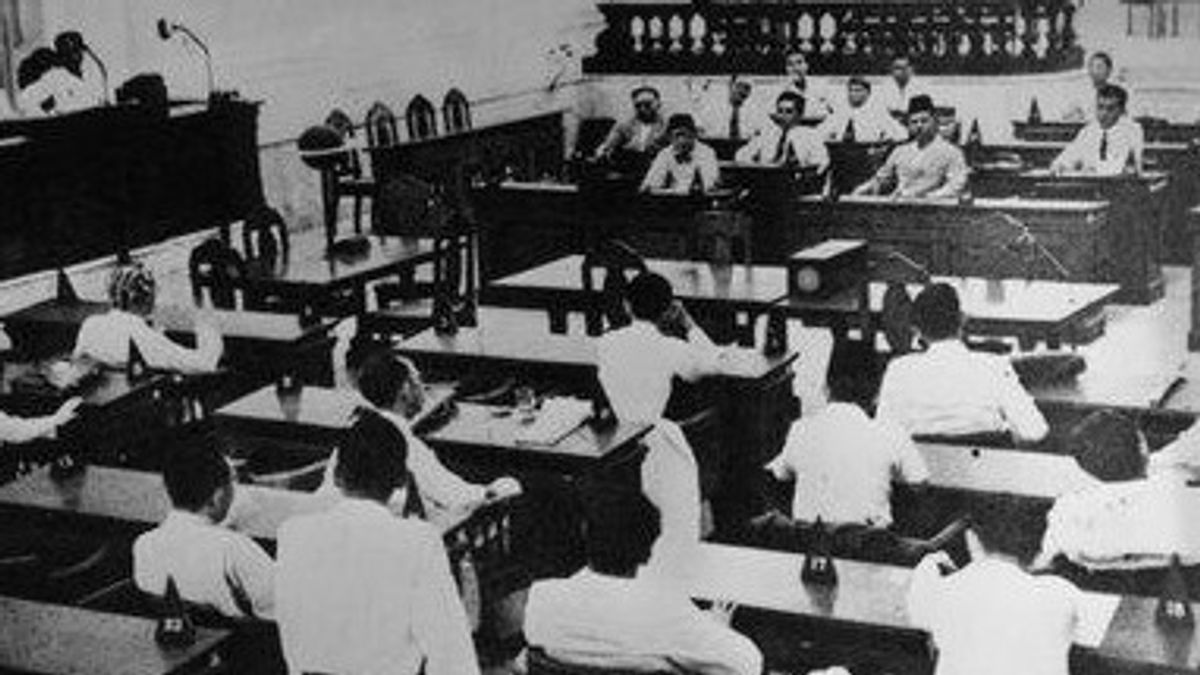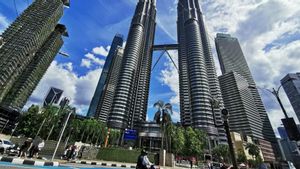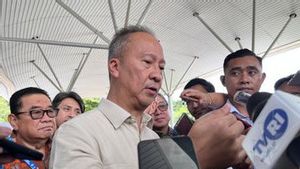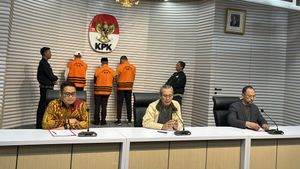JAKARTA - The urgency of Japan in World War II was a factor driving Indonesia's independence. Japan seeks support, spreads the promise of independence. The Investigating Agency for Preparation for Independence (BPUPKI) was formed as the driving force. Pancasila and the Jakarta Charter were formulated. However, the Jakarta Charter became the forerunner of the 1945 Constitution because it contains a narrative of enforcing Shari'a. Even the president must be Muslim. That point is then omitted.
Japan's defeat in World War II did not come suddenly. One by one, the areas that became a barn of power began to be controlled by the allies. News of Japan's defeat echoed everywhere, including in the archipelago. As a form of anticipation of the emergence of the seeds of revolution, Japan 'returned' to spread the promise of independence to the natives.
They also provide relaxation for the political activities of national figures from the pulpit to the pulpit. Japan also allowed the red and white flag to fly. Even with the singing of the national anthem Indonesia Raya. After that, with the permission of Japan, BPUPKI was established in March 1945.
Its membership is filled with big figures, such as Rajiman Wediodiningrat, Soekarno, Hatta, to Ki Hajar Dewantara. The selection of these figures is considered to represent a cross of schools of thought. His duties include formulating the form of the state, state boundaries, to the basic philosophy of the state.
“BPUPKI members were sworn in on May 28, 1945, and between May 29 and June 1 1945 the first sessions were held which turned out to be quite warm. BPUPKI members initially numbered 60, then increased by eight, to 68 people. From the point of view of the balance of political ideology, according to Prawoto Mangkusasmito's observations, only about 20 percent of the 68 people truly represent the political aspirations of the Islamic group."
“The rest represent the view of nationalism which in this case does not want to bring religion into state problems. Meanwhile, what is meant by the political aspirations of the Islamic group is the proposal of Islam as the philosophical basis of the state to be established. For them, Islam is complete, covering all dimensions of human life,” said Ahmad Syafii Maarif in the book Islam and Politics: Bamboo Splitting Theory during the Guided Democracy Period 1959-1965 (1996).

The historic event was successfully written on June 1. In the special session, Soekarno put forward the "five principles" Pancasila doctrine which would become the official philosophy of an independent Indonesia: nationality, humanity, democracy, welfare, and divinity.
When Bung Karno finished his speech, he was greeted with thunderous applause. Shortly after, there was a suggestion that Islam be used as the basis of the state. The proposal then triggered a form of compromise known as the Jakarta Charter.
“Although these principles are generally accepted by BPUPKI members, Islamic leaders are not happy because Islam does not seem to be playing a special role. Finally, they agreed to a compromise called the Jakarta Charter which stated that the state would be based on 'divinity,' with the obligation to enforce Islamic law for its adherents."
"The implications of the Jakarta Charter for the relationship between Islamic law and the state will be a source of fierce conflict in the years to come," wrote historian MC Ricklefs in the book History of Modern Indonesia 1200-2004 (2005).
The Jakarta Charter was changed in a hurryThe first BPUPKI session was indeed successful in spawning Pancasila. But not on the basis of the Republic of Indonesia. As a follow-up, all members of BPUPKI formed a Committee of Nine, chaired by Soekarno. This committee aims to ensure and get a decision on previous ideas regarding the formulation of the state basis.
After a lengthy debate for 21 days, on June 22 a political compromise over two patterns of thought approved the issuance of the Jakarta Charter. The debate then resulted in Pancasila which was accepted as the basis of the state. But the order of sila has changed its location. The subject of "God Almighty" appears as the most important. It was also given an accompanying sentence "with the obligation to carry out Islamic law for its adherents."
The Jakarta Charter was finally ratified as the Preamble to the 1945 Constitution. However, the compromise only lasted for 57 days or precisely on August 18, 1945. The accompanying sentence consisting of seven or eight words above was perceived by some Bumiputras in the Eastern hemisphere as discriminatory against adherents of other religions. . For this reason, for the sake of Indonesian unity, on August 18, 1945, this clause was removed from the preamble of the 1945 Constitution.
“Apparently, support from a number of circles for the Jakarta Charter did not last long. The demands of the Christians in the Kaigun (Japanese Navy) area, as conveyed by an officer to Moh. Hatta. They object to the clause in the Preambule which reads, 'God with the obligation to carry out Islamic law for its adherents.' They admit that they are not bound by the clause, but view it as discrimination against them as a minority group," concluded Peter Kasenda in the book Bung Karno Panglima Revolution (2014).

After intense debate, the figures who insisted on agreeing to the Jakarta Charter softened. Changes were also made by changing the body of the 1945 Constitution. In the official meeting of the BPUPKI, which had changed its name to the Preparatory Committee for Indonesian Independence (PPKI), a number of things were agreed upon. Among other things, changing the word "Mukaddimah" in the preamble of the 1945 Constitution to "preamble." The narrative "The President is a native Indonesian and a Muslim" as stated in Article 6 paragraph 1 of the 1945 Constitution, immediately omitted the sentence "Muslim."
Furthermore, the narrative in Article 29 paragraph 1 "The state is based on God, with the obligation to carry out Islamic law for its adherents" was also changed. Because of that, the sentence only leaves the narration "A country based on God Almighty."
“Both were later abolished after receiving objections from Eastern Indonesian Christians. The government structure was also formed by stating that all Indonesians who were advisory officials to the Japanese government now replaced the Japanese on behalf of the Republic," concluded MC Ricklefs, Bruce Lockhart, Albert Lau, Portia Reyes, and Maitrii Aung-Thwin in the book History of Southeast Asia: From Prehistoric to Contemporary (2013).
*Read other information about PANCASILA or read other interesting articles from Detha Arya Tifada.
Other BERNASThe English, Chinese, Japanese, Arabic, and French versions are automatically generated by the AI. So there may still be inaccuracies in translating, please always see Indonesian as our main language. (system supported by DigitalSiber.id)













